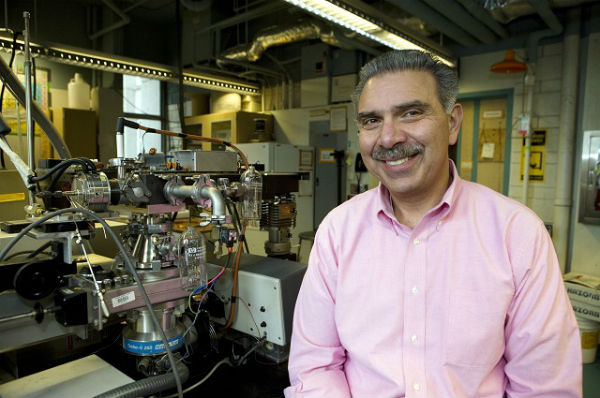Tufts Professor Works with Medford, Somerville Students on Cafeteria Project
Project cuts fat, oil and grease build-up in Somerville and Medford school cafeteria plumbing systems, improving their efficiency

A Tufts University chemistry project that used new, environmentally friendly technology to reduce the troublesome build-up of fat, oil and grease (FOG) in the plumbing of Somerville and Medford’s high school cafeterias taught high school students about scientific research in the process.
FOG, a common problem in institutional kitchens and restaurants, can result in clogged pipes and grease traps, costly clean-outs and repairs and blocked municipal sewer systems.
The project was led by Somerville native Albert Robbat, Jr., Ph.D., a Tufts University associate professor of chemistry, and his Tufts students. For Robbat, who credits a Somerville High School teacher with inspiring him to pursue a career in science, the project was an opportunity to give back to his hometown.
“This is all about helping students understand how science solves real-world problems. When we began, my hope was to not only achieve the goal of eliminating the buildup of FOG in the cafeterias’ plumbing systems but also to help get students excited about science and how it makes a difference in the world,†said Robbat. “I think we succeeded on both fronts.â€
Susan Schmidt, a Somerville High School chemistry teacher, and Brian Mernoff, a Medford High School science teacher, said the program gave students an opportunity to carry out open-ended research that will have an impact on their community.
“Because this is a real research project, students get to ask their own original questions and apply what they have learned in class to find the answers,†said Mernoff. “The students are very excited and enthusiastic about analyzing the samples as well as finding ways to answer their own questions about the degreaser product.â€
“This could be a seed for a great science fair project in future years for a motivated student who wants to find cost-effective, environmentally friendly ways to remediate the grease buildup from the culinary arts kitchen at Somerville High School,†added Schmidt.
The project built on a pilot conducted from November 2014 through June 2015 in one of Tufts’ cafeterias by Robbat and undergraduate and graduate students in his research group in collaboration with researchers at Protein Matrix LLC, which makes a plant-based extract that converts fat, oil and grease to soluble by-products. The degreaser works by chopping large fat molecules into smaller molecules, making it easier for the molecules to flow through pipes and be digested by the microorganisms in wastewater treatment plants.
“Every city has a major problem with FOG,†said Robbat. Conventional methods for removing FOG use bacteria, enzymes, caustics and solvents that can damage pipes or downstream treatment processes, he said. Frequently, these methods result in FOG moving downstream, clogging in places that are very hard and costly to reach.
By contrast, the protein/polypeptide mixture used by Robbat’s team is biodegradable, nonflammable, non-carcinogenic and nontoxic to fresh and saltwater organisms.
For the Somerville and Medford high school projects, Robbat’s team designed a mechanism to automatically feed the mixture into the cafeterias’ plumbing systems. Students adjusted the dose and collected and analyzed samples. An independent laboratory also collected and analyzed samples, enabling students to compare their efforts to those of professionals. By experimenting with different doses and measuring their effect, students learned how to gather and assess data, hypothesize and draw conclusions.
The project was approved by the Somerville and Medford plumbing departments and the Massachusetts Water Resources Authority (MWRA), which serves Somerville, Medford and 61 other communities.
Patrick Antle, a Tufts post-doctoral fellow, and Tufts undergraduate students participated in the program by teaching and mentoring students. Antle was recognized at Somerville High School’s Science Technology Engineering and Math (STEM) Awards night for his contributions to the science curriculum this year.
Robbat hopes to continue the program in future school years, with a goal of expanding the project to include middle school students who would be mentored by high school students.
This is not the first time Robbat has brought hands-on science to the public schools. Last year, Medford students tested soil contamination levels at Middlesex Fells Reservation in a program designed by Robbat and overseen by Nicholas Wilton, a graduate assistant. The students used Tufts facilities to analyze their soil samples.
– Submitted by Tufts University